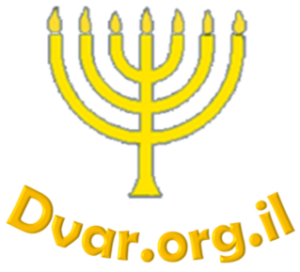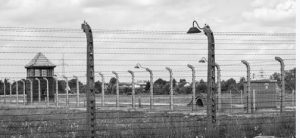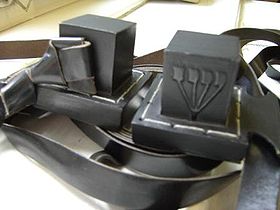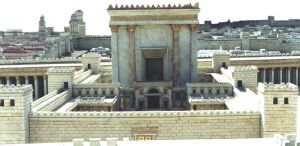
Parashat Vaetchanan
‘I implored G-d at that time…’ – Moses
How great is our leader, Moshe Rabbenu! But can we ever fully comprehend his greatness? So intense was his love for the Land of Israel that he prayed an incredible 515 prayers to Hashem (hinted at in the first word “Va’etchanan” above). These were prayers imploring Hashem to let him enter Israel.
What was even more incredible was the quality of his supplication. There are ten types of prayers enumerated by the commentary Sifre. Moshe chose a form of prayer which is literally called ‘begging for a free gift’. When it came to his own merit, Moshe Rabbenu saw himself as a pauper who has no choice but to ask for a ‘free gift’ of mercy. He did not complain to Hashem that he should enter the Land and fight the kings of Canaan, despite the fact that he had defeated the two mighty kings, Sichon and Og. Moshe Rabbenu, the most modest of all men, did not mention any of his achievements. He only pleaded to see the Land, specifically Jerusalem and the Temple Mount.
On speaking to Moshe regarding the new leader of the Jewish People, why did Hashem tell him to “strengthen [Joshua] and give him resolve”? We know that Joshua already knew that Moshe would die and he would take his place. Why the extra pep talk? Since Joshua believed that Moshe’s prayers would be easily accepted, he made no preparations to continue as the new leader, therefore Moshe had to remind him that in fact he was the man for the job.
Regarding the decrees of the Torah ordained by Hashem, the pasuk says “Beware for yourself and greatly beware for your soul”. There are two ways for our Torah to be forgotten, Heaven forbid: passively, (for example a father doesn’t give his children Torah, although he doesn’t teach them bad things, either) or actively (a father sends his children to a non-Jewish or secularised school). In this pasuk, “beware for yourself” refers to the passive way, and “greatly beware” refers to the active way, as this is more severe.
The Torah is said to be presented as “white fire on black fire”. Why fire? A little fire dispels much darkness. How true of our Holy Torah, which is the lifeblood of all creation! On the other hand, those who transgress the commandments of the Torah will be consumed by the fire.
Why is the Torah written on two tablets? The first is an introduction to the second. In the latter half, we are told of the commandments regarding not stealing, jealousy etc. Man’s natural desire is to transgress these commandments. Contained in the first half are the commandments about G-d. It would be impossible to ask people to go against their natural inclinations without making them aware of Hashem. Therefore, these commandments come first.
Moshe warns the people about the danger of bowing down to false gods such as the stars and planets. How could this carry such a grave punishment? Is it such a crime? After all, the planets are so high in the sky that they could, theoretically, be mistaken by people for heavenly rulers. Incorrect – such people, sadly, are straying from common sense. Let’s give an analogy. A man is seen walking around the king’s palace, day in, day out. He is never seen doing anything else other that walking around. Could it naturally be assumed that he is the king? No. He is merely a servant, under control of the king who has probably commanded him to be a guard. This man has no free will – he merely does as he was told. So it is with the planets. They have no ‘will’ of their own. They are merely put into their orbits by Hashem, and ‘do as they are told’!
Moshe reminds the people that after his death, they will enter the Land. Aren’t the people well aware of this fact already? Moshe does this so that the people won’t make the mistake that they did at Mount Sinai, and say ‘Moshe is not coming back: Let’s make a golden calf’ (G-d forbid).
Moshe goes on to repeat the Ten Commandments. Regarding the Sabbath, he says “Safeguard [Shamor] the Sabbath to sanctify [Lekadsho] it”. Why doesn’t it just say “safeguard the Sabbath” or “Sanctify the Sabbath”? The reason is, that both words refer to different things. “Shamor” means you should guard and look forward to the Sabbath, and “Lekadsho” means that it should not just be for a rest day with the tv, or shopping in the car, but a day for ‘sanctity’.
Why here, is the Sabbath referred to as a remembrance of Egypt, as opposed to at Sinai, when it was a remembrance of Creation? At Sinai, the people were so busy complaining about having left Egypt that they didn’t realise the importance of the Exodus. Here, the Israelites were on the borders of the Land of Israel, which they were just about to possess. It was now that their emancipation from slavery had more significance.
One of the Ten Commandments enumerated here is “Honour your father and mother”. The gemara says that this also applies to honouring older brothers and sisters. This is because the older siblings spend more time with the parents, and therefore know more of their ways. Honouring them is similar to honouring your parents. Moshe says afterwards “…as Hashem commanded you”. Isn’t it obvious, being one of the Commandments, that it was from G-d? Here, though, Moshe was addressing the children of the generation of the desert, who had suffered because of the sins of their fathers. Moshe stressed that it was Hashem who commanded it, so that you should accord your parents honour regardless of how satisfied or dissatisfied you are with your life.
We are told that the Torah was given [with] “a great voice, not to be repeated”. This shows that the Torah is unique, a true one-off, and it will never be imitated. And it’s ours! What will you do with it?
It transpires that in Egypt, all the nations (including the Jews) were idolatrous and worshipped a visible god. As a result, when they were taken out by Moses, all they wanted from Hashem was to see His glory and hear His voice. Even the people who believed in Him, didn’t believe that he was concerned with the lower world, which is why these questions were so widespread. These two request were granted at Sinai.
However, Moshe was addressed with the word “At”, the feminine form of ‘you’. The reason for this was that when the Israelites were at Sinai, their souls fled from them. Moshe, who was at the top of the mountain with G-d, was spoken to in the feminine because the Israelites wanted him to do what only a woman can do – take a seemingly meaningless drop and transform it into a child. That is to say, take what G-d says and transform it into plain, clear words so that the Israelites could “hear and do”.
Now we have the first paragraph of the Shema. Why does it start “Hear O Israel”? Even for such an evident truth as pronouncing G-d’s unity in the Shema, one must get the people’s attention first! And why do we close our eyes? To hide from the various evils that stand before us – wicked people prospering, righteous suffering. We mustn’t believe what we see through our limited human vision. Hashem is the One and Only! As this is such an important message, when we say the Shema we should have in mind that we are addressing the entire Jewish People.
Moshe ends the sedra by talking about possession of Israel, and the seven mighty nations that inhabit it, who will all be vanquished. The Sages tell us that each nation was as big as Israel. But because ewe made ourselves humble, G-d chose us.
Can you meet the challenge?
SHABBAT SHALOM





